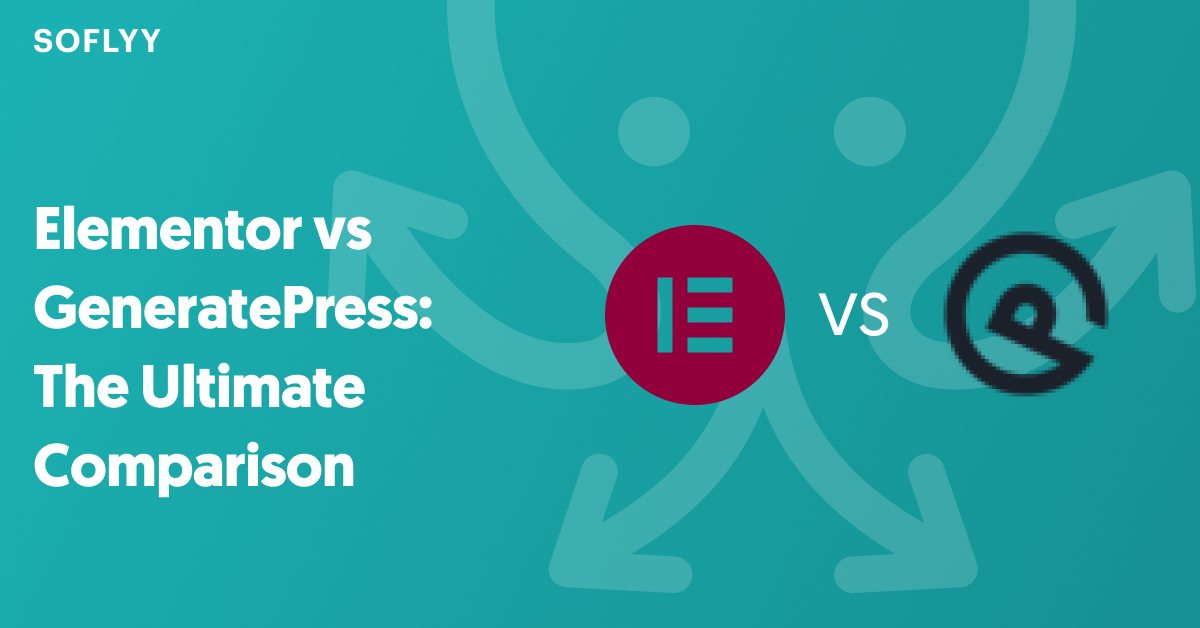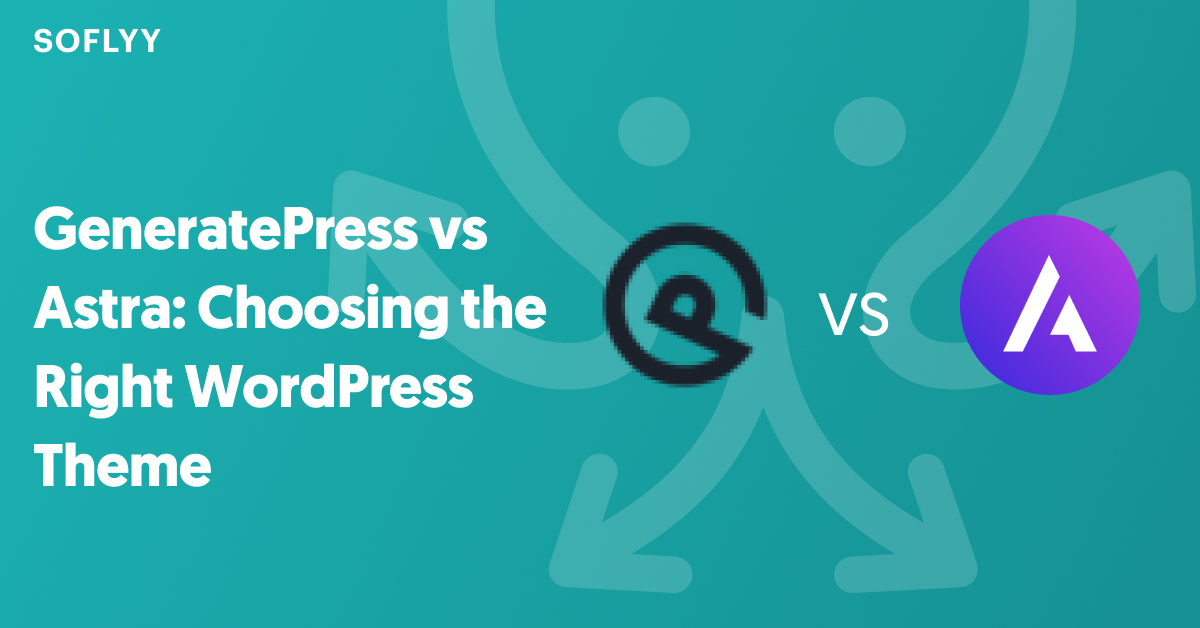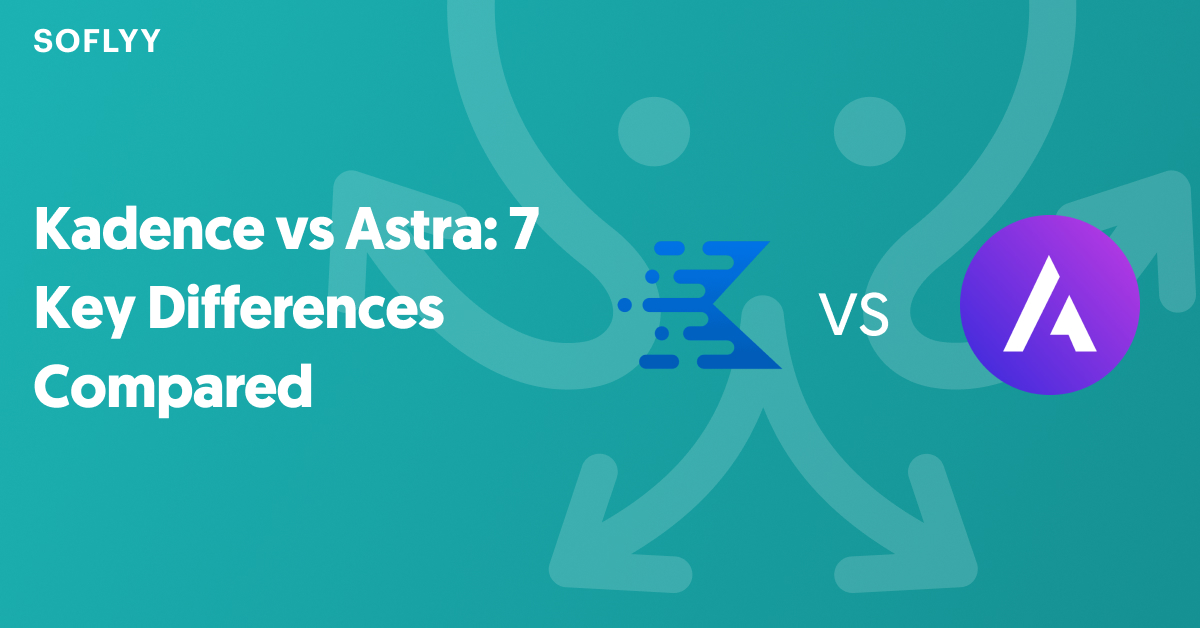In today’s competitive eCommerce landscape, selecting the right platform for your online store is essential. The platform you choose can directly influence your store’s functionality, growth potential, and overall success. Among the top contenders, WooCommerce and Wix stand out, each offering distinct advantages for different types of users.
WooCommerce, a robust plugin for WordPress, is known for its unmatched flexibility and scalability. It’s a favorite among tech-savvy entrepreneurs who require advanced customization options. In contrast, Wix is a comprehensive website builder designed to simplify eCommerce for beginners. Its all-in-one solution includes hosting, templates, and an intuitive drag-and-drop editor, making it accessible to anyone, regardless of technical expertise.
In this article, we’ll dive into the nuances of WooCommerce vs Wix, evaluating their ease of use, customization features, pricing structures, SEO capabilities, performance, and scalability. This comparison will help you determine which platform aligns best with your business needs.
WooCommerce vs Wix: Quick Overview
WooCommerce Overview
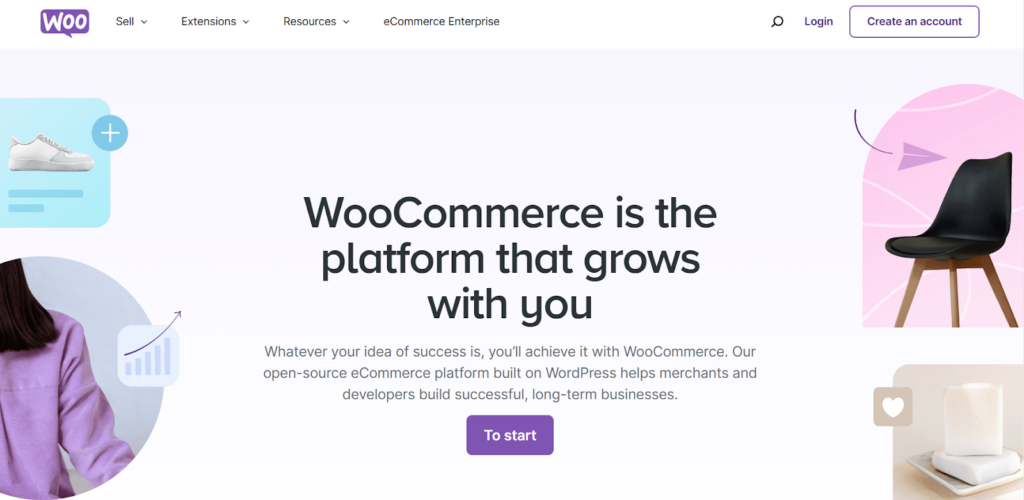
WooCommerce is an open-source WordPress plugin that empowers users to turn their WordPress site into a fully functional eCommerce store. Its adaptability and robust feature set have made it a go-to choice for businesses of all sizes, from startups to large-scale enterprises.
One of WooCommerce’s standout qualities is its extensive customizability. With thousands of plugins and themes available, you can tailor your store’s design and functionality to align with your unique needs. Whether you want advanced payment options, enhanced product galleries, or specific marketing tools, WooCommerce makes it possible to build the exact experience you envision for your customers.
Scalability is another key advantage. As your business grows, WooCommerce grows with it. The platform can handle everything from a small catalog of items to a massive inventory with high-traffic demand, making it ideal for businesses planning for long-term success.
WooCommerce also gives you full control over SEO and performance. This allows you to optimize your site for search engines and deliver fast-loading pages, crucial for attracting and retaining customers in a competitive online marketplace.
WooCommerce supports a variety of product types, including physical products, digital downloads, subscriptions, and even affiliate-linked items. This versatility ensures that you can sell almost anything through your store, giving you the freedom to diversify and expand your offerings as needed.
By blending flexibility, scalability, and advanced features, WooCommerce remains a top contender for businesses looking to create a tailored and powerful online store.
Wix Overview

Wix is an all-in-one website builder that comes with integrated eCommerce functionality, making it an appealing option for those looking to create online stores quickly and without the need for technical skills. Whether you’re a small business owner or a beginner, Wix simplifies the process of setting up and managing an online store.
The drag-and-drop interface is one of the platform’s biggest selling points. It allows you to easily arrange your site elements, like product galleries and shopping carts, with no need to touch a single line of code. This ease of use makes Wix ideal for users who want to focus on their business, not the technical side of website creation.
Wix also takes care of hosting, security, and ongoing maintenance for you. This is a huge advantage for busy business owners who don’t want to worry about technical upkeep. With hosting and security built into the platform, Wix ensures your site runs smoothly and stays protected.
For those looking to get up and running quickly, Wix offers a range of pre-designed templates. These templates are customizable, allowing you to choose a layout that suits your brand and start adding products right away. Whether you’re selling physical goods or digital products, these templates streamline the setup process, making it easier to launch your store without starting from scratch.
Overall, Wix stands out as a beginner-friendly platform that removes the complexity often associated with setting up an online store, making it an excellent choice for small business owners looking for an all-in-one solution.
WooCommerce vs Wix: A Quick Comparison
Before diving into the details, here’s a quick comparison table that highlights the key differences between WooCommerce and Wix. This will give you a clear overview of each platform’s strengths in areas like ease of use, customization, eCommerce tools, pricing, scalability, and more.
| Feature | WooCommerce | Wix |
| Ease of Use | Moderate learning curve; requires WordPress knowledge. | Beginner-friendly drag-and-drop interface. |
| Customization | Unlimited, with thousands of plugins and themes available. | Limited to built-in tools and Wix App Market extensions. |
| eCommerce Features | Advanced capabilities with plugins (e.g., subscriptions, booking systems). | Built-in features suitable for small to mid-sized stores. |
| SEO | Highly customizable with tools like Yoast SEO and RankMath. | Basic SEO tools included, but less advanced than WooCommerce. |
| Performance | Dependent on hosting provider and optimizations. | Fully managed performance, but less scalable for large stores. |
| Pricing | Free plugin; costs depend on hosting, themes, and plugins. | Subscription plans starting at $27/month. |
| Scalability | Ideal for large, growing businesses with complex requirements. | Best for small to mid-sized stores; limited scalability. |
| Hosting | Requires separate hosting (e.g., SiteGround, Bluehost). | Hosting included in subscription. |
| Payment Gateways | Wide range of payment gateway integrations. | Limited options compared to WooCommerce. |
| Target Audience | Tech-savvy users or businesses with specific customization needs. | Beginners and small business owners prioritizing simplicity. |
After reviewing the key differences between WooCommerce and Wix in the comparison table, it’s time to explore each feature in more detail.
WooCommerce vs Wix: Ease of Use
WooCommerce
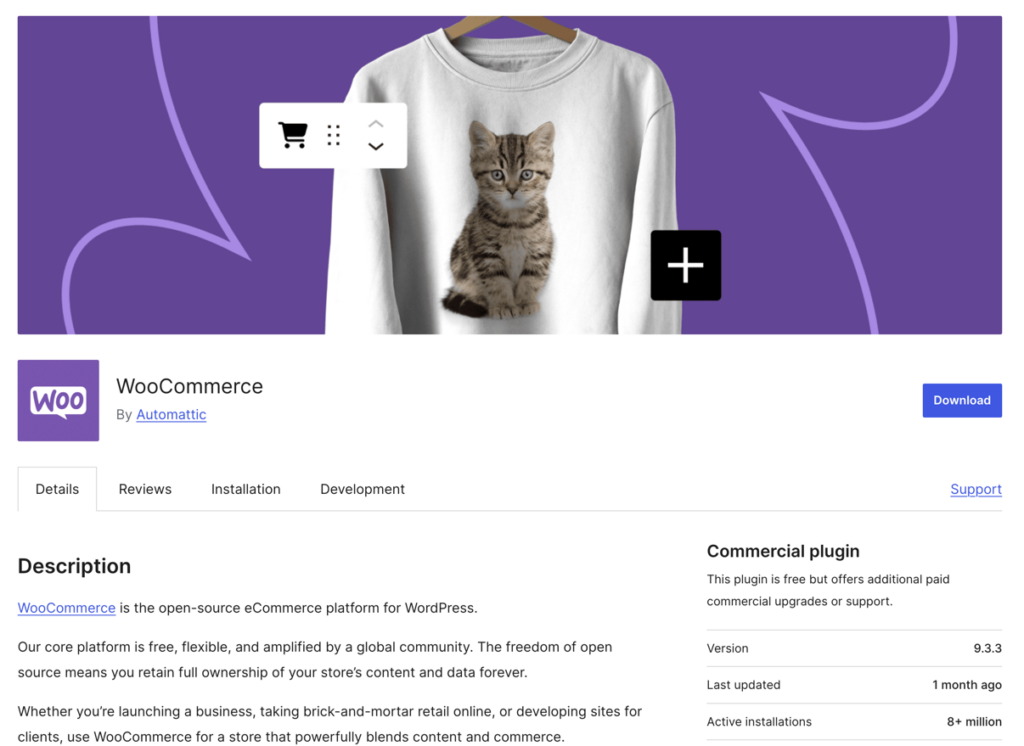
WooCommerce is a WordPress plugin, so setting it up requires a basic understanding of the WordPress ecosystem. The process involves, selecting a hosting provider, installing WordPress, and then adding and configuring the WooCommerce plugin. While this may seem technical to beginners, the setup is manageable with a bit of time and effort.
One of WooCommerce’s strengths is the extensive resources available to support new users. Whether it’s detailed tutorials, active forums, or thorough documentation, there’s no shortage of guidance for those navigating the setup process. This wealth of information can be particularly helpful for first-time users looking to familiarize themselves with the platform.
For those willing to invest the effort, WooCommerce rewards users with a high level of customization and flexibility. From product management to advanced integrations, this platform gives you the tools to create a store tailored to your specific needs. However, this flexibility comes with a learning curve, making it best suited for those ready to explore its features in depth.
Wix

Wix caters to users looking for a fast and straightforward way to build an online store. Its drag-and-drop interface is specifically designed for non-technical users, allowing them to create visually appealing websites with minimal effort. This user-friendly approach eliminates the need for any coding knowledge, making it a perfect fit for beginners or business owners who want to focus on their products rather than the technicalities of website building.
As an all-in-one platform, Wix takes care of the essentials, including hosting, pre-designed templates, and a guided setup process. These features streamline the experience, helping users get their online stores up and running in no time. With hosting and security already included, there’s no need to worry about managing multiple services.
For those seeking simplicity and quick results, Wix delivers a hassle-free solution. Whether you’re a small business owner or someone new to eCommerce, this platform provides all the tools you need to launch a professional store without any technical headaches.
WooCommerce vs Wix: Customization Features
WooCommerce
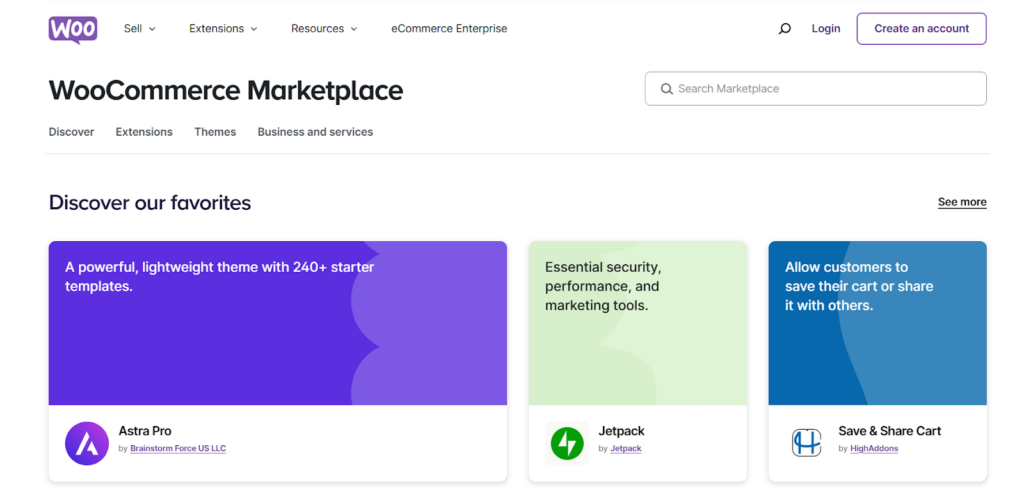
WooCommerce offers extensive customization options with thousands of themes and plugins, allowing you to create an online store tailored to your needs. You can easily adjust the look and functionality of your site to reflect your brand. Developers can dive into the code using HTML, CSS, and PHP to craft custom designs and features, including layouts and checkout processes.
For those who prefer a visual approach, page builders like Breakdance and Elementor provide drag-and-drop options to design your store without the need for coding. WooCommerce also supports advanced business models, such as multi-language stores and dynamic pricing, making it suitable for international markets or tiered pricing. As your business grows, WooCommerce adapts to meet your changing needs.
Wix

Wix makes store creation easy with over 500 pre-designed templates, allowing you to quickly launch a professional-looking site. These templates cater to various industries, ideal for small business owners or beginners who want a hassle-free setup.
While Wix offers customization through its built-in tools and the Wix App Market, its flexibility is limited compared to platforms like WooCommerce. The available apps and features are suited for basic to mid-level customization but may not meet the needs of businesses with more complex requirements.
For more design control, Wix provides EditorX, a premium tool with advanced layout and styling options. However, even with EditorX, Wix doesn’t offer the same level of customization as WooCommerce, especially for businesses with advanced needs or rapid growth plans.
WooCommerce vs Wix: eCommerce Features
WooCommerce
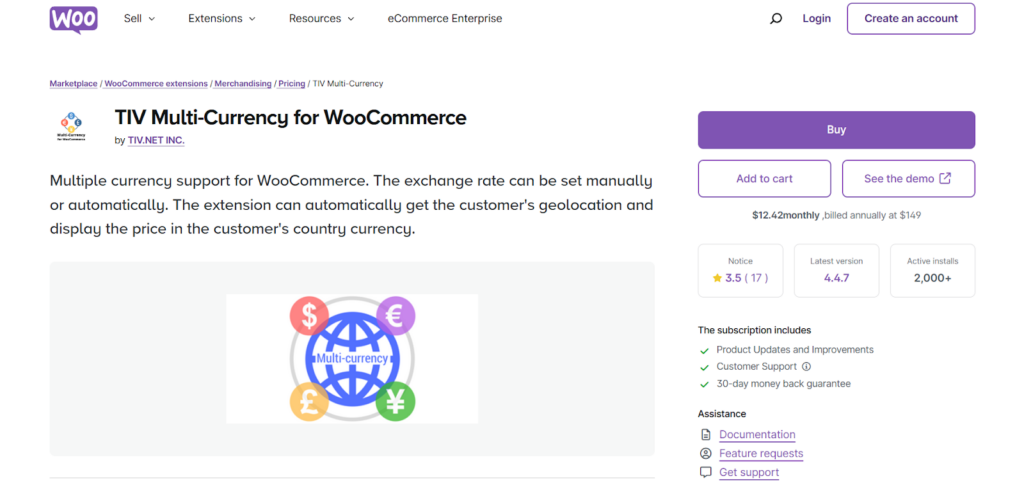
WooCommerce offers advanced eCommerce capabilities through its wide range of plugins. Whether you need subscription products, appointment bookings, or a custom checkout, there’s a plugin to suit your needs, making it ideal for businesses that want to tailor their stores.
A key feature of WooCommerce is its support for variable product configurations, allowing businesses to offer different sizes, colors, or custom options in a single listing. This, combined with customizable checkout experiences, helps create a personalized shopping experience for customers.
For businesses expanding internationally, WooCommerce’s multi-language and multi-currency support allows you to reach a global audience with localized pricing. The platform also integrates seamlessly with third-party tools like CRMs, email marketing, and analytics, helping businesses manage customers, run targeted campaigns, and scale effectively.
Wix

Wix provides essential tools for small to medium-sized stores, allowing users to create attractive product galleries, manage shipping, and apply discounts with ease. These features make it a practical choice for business owners without technical expertise.
Wix also offers basic marketing tools, such as email campaigns and abandoned cart recovery, to help store owners re-engage customers. While these tools are not as advanced as some platforms, they are adequate for businesses with simpler needs.
However, Wix has limitations. It doesn’t support advanced features like wholesale pricing or complex product variations, and lacks options for custom checkout flows or extensive customization, making it less suitable for businesses with more sophisticated requirements. For straightforward stores, Wix offers a reliable, all-in-one solution.
WooCommerce vs Wix: SEO
WooCommerce
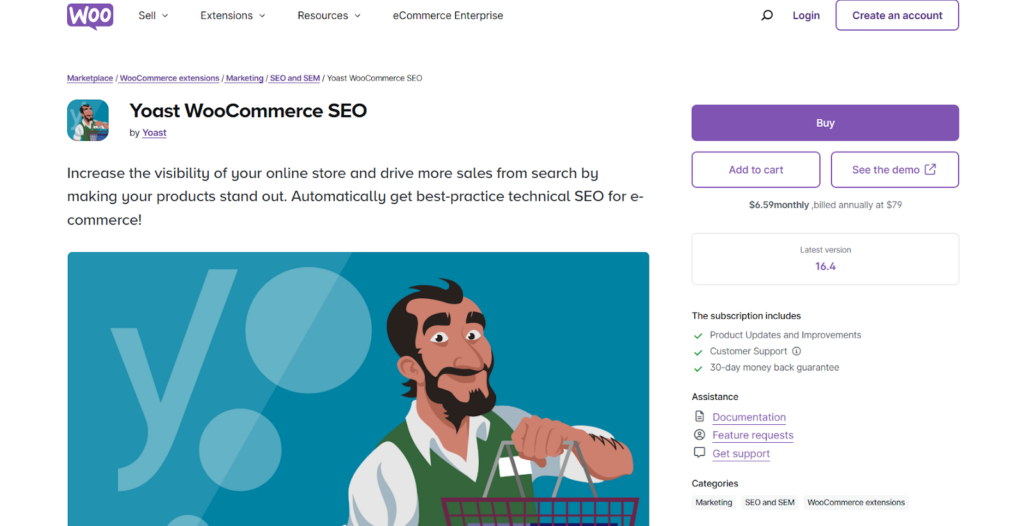
WooCommerce offers full control over SEO, allowing businesses to edit key elements like meta tags and permalinks for better search rankings. It also supports schema markup, helping search engines understand your content and display rich results.
For advanced SEO, WooCommerce integrates with plugins like Yoast SEO and RankMath, offering tools for keyword analysis and readability checks. These plugins simplify optimization for users at all levels.
Advanced users benefit from features like canonical URLs, custom sitemaps, and indexing controls for precise optimization. If boosting organic traffic is a priority, WooCommerce provides robust SEO tools to help you stay competitive.
Wix
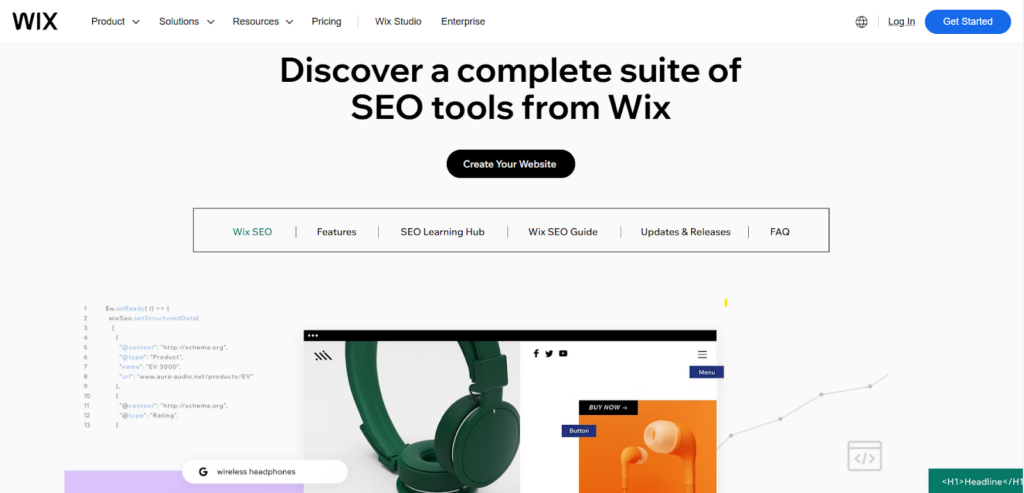
Wix offers basic SEO tools suitable for smaller websites. Users can edit metadata, optimize for mobile, and add alt text to images for better accessibility and search engine visibility. It also includes 301 redirects and structured data support for common SEO tasks.
However, Wix lacks the flexibility of more advanced platforms like WooCommerce, particularly for complex strategies, such as schema management or canonical URL controls.
For businesses with straightforward SEO needs, Wix is a practical choice, offering the essential tools for building a search presence without technical complexity.
WooCommerce vs Wix: Performance
WooCommerce
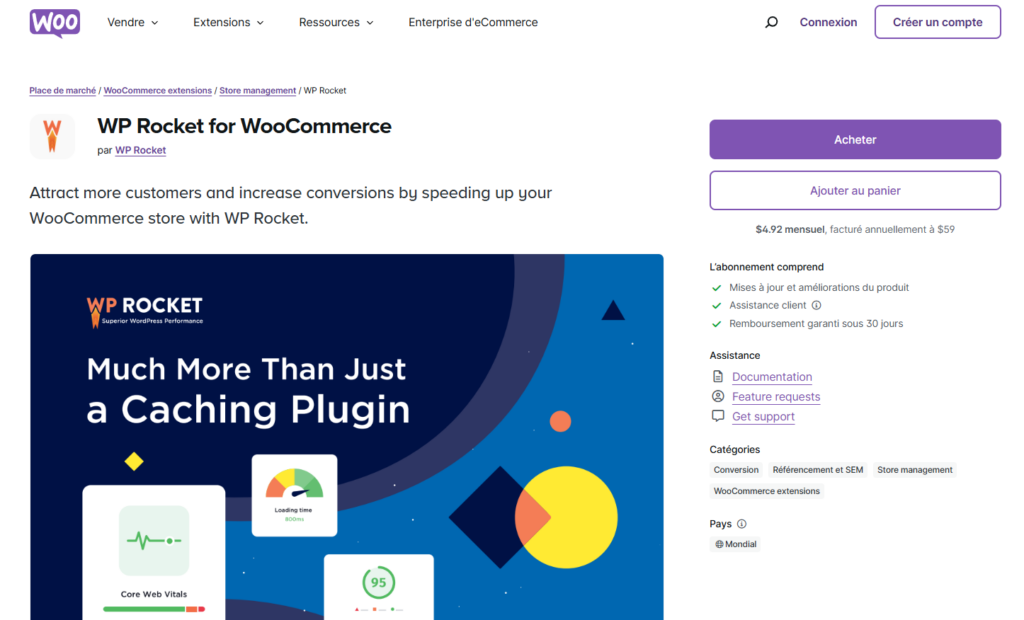
WooCommerce’s performance is influenced by your hosting choice and site optimizations. A reliable hosting provider, especially managed WordPress hosting, is essential for handling traffic and transactions effectively. Managed hosting options tailored for WooCommerce’s needs generally provide the best performance.
To enhance speed, tools like WP Rocket help optimize load times by reducing resource usage, optimizing CSS and JavaScript, and enabling browser caching. Additionally, using a Content Delivery Network (CDN) further improves performance by distributing content across multiple servers, ensuring fast delivery to visitors worldwide.
However, WooCommerce requires manual adjustments for optimal performance. This includes image compression, database optimization, and regular monitoring. Fine-tuning these details ensures your site operates smoothly even during varying traffic conditions.
When properly configured, WooCommerce can handle high-traffic websites, making it an excellent choice for businesses expecting growth and scalability.
Wix
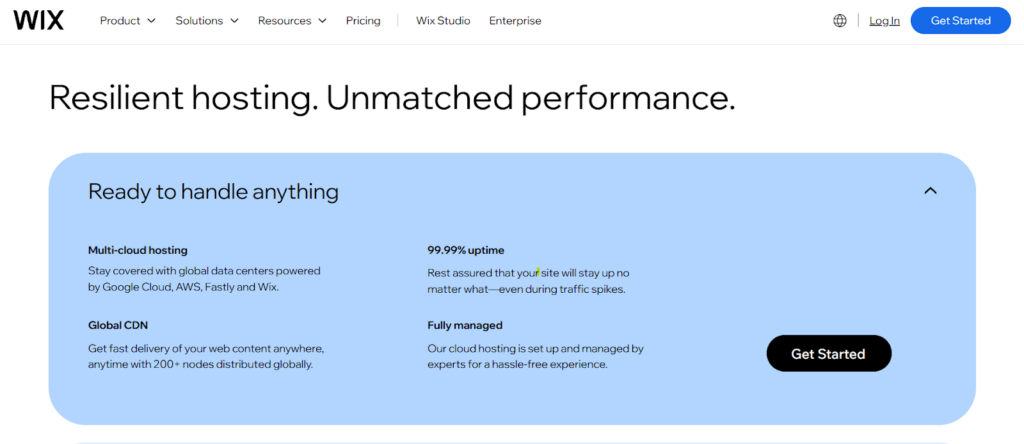
Wix provides fully managed hosting, ensuring reliable performance for smaller to mid-sized stores without the need for server management or technical configurations. This makes it an ideal choice for those seeking a hassle-free experience.
The platform includes automatic optimizations, such as image compression and responsive design, which enhance speed and mobile-friendliness without manual adjustments. These features help keep your store user-friendly and fast across devices, benefiting small businesses.
However, Wix may face scalability challenges as your store grows. Larger stores with heavy traffic or advanced features could experience slower load times or limitations in customization. This makes Wix best suited for those needing reliable performance without extensive management.
For businesses prioritizing simplicity and ease of use, Wix is a great choice. But if you expect significant growth or need more flexibility, you may need to explore other platforms.
WooCommerce vs Wix: Scalability
WooCommerce
WooCommerce offers unmatched scalability, making it the perfect choice for businesses that need to grow without limitations. With WooCommerce, you can continuously add plugins to enhance functionality, upgrade your hosting as traffic increases, and implement custom solutions tailored to your business’s specific needs. This flexibility is key for handling everything from large stores to highly complex operations.
Businesses experiencing high traffic or requiring advanced features will find WooCommerce’s scalability ideal. You can easily scale up without compromising site performance or functionality. Custom development is also a major benefit of WooCommerce, allowing businesses to create unique workflows that align with their specific needs. Moreover, WooCommerce seamlessly integrates with enterprise-level tools, making it a go-to solution for larger businesses and enterprises that demand high performance.
Wix
On the other hand, Wix is best suited for small to medium-sized stores looking for a simple, straightforward eCommerce platform. While Wix’s premium plans do offer some scalability, the platform does have inherent limitations when it comes to handling high volumes of traffic or managing complex operations. As businesses grow, Wix may struggle with advanced inventory management or international expansion, making it less ideal for stores with rapidly increasing demands.
Wix works well for businesses with predictable growth, where the need for complex integrations or custom workflows is minimal. It’s a great choice for those who need a quick setup without the technical overhead, but as your business grows in size or complexity, you may find the platform’s scalability limited compared to more customizable solutions like WooCommerce.
WooCommerce vs Wix: Payment Gateways
WooCommerce
WooCommerce stands out for its extensive range of payment gateway options. It supports well-known options like PayPal, Stripe, and Square, making it easier for businesses to accept payments from a global customer base. Additionally, WooCommerce allows for custom integrations, so businesses can implement alternative payment methods tailored to their needs. Whether it’s digital wallets, direct bank transfers, or region-specific payment systems, WooCommerce provides the flexibility to accept almost any payment type.
Another advantage is that WooCommerce does not impose any transaction fees on top of the charges from the chosen gateway. This is a huge benefit for businesses looking to minimize additional costs. The platform is well-suited for international businesses or those that require diverse payment options, ensuring that customers can pay in the way most convenient for them.
Wix
Wix, while offering a more straightforward approach, also supports popular payment gateways like PayPal, Stripe, and Wix Payments. However, its options are more limited compared to WooCommerce, making it less ideal for businesses with complex payment needs. For example, it lacks the ability to easily integrate many alternative payment methods.
Another key consideration is that Wix may charge transaction fees depending on the plan and payment method selected. This can add up, especially for businesses with higher transaction volumes. Wix is a great choice for businesses with simpler payment needs, offering an easy setup and reliable integration for common payment methods, but it’s not as flexible as WooCommerce for businesses that require a broader range of payment options.
WooCommerce vs Wix: Support
WooCommerce
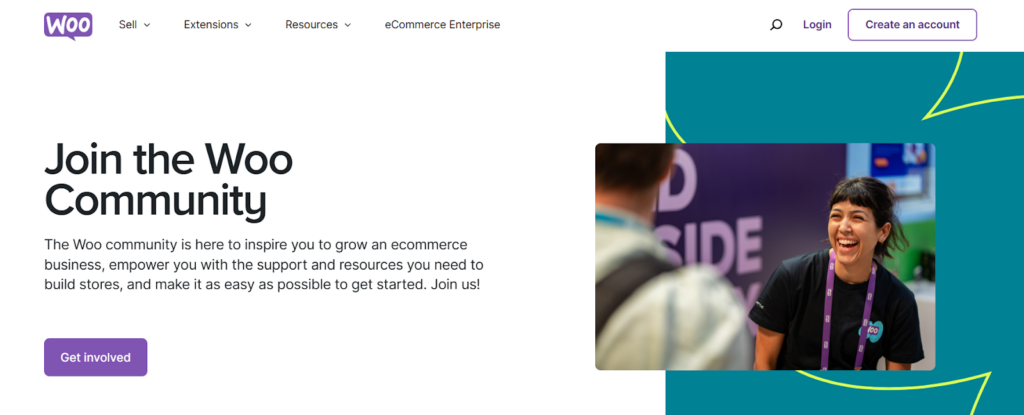
When it comes to support, WooCommerce relies heavily on its vast community and comprehensive documentation. There are plenty of forums, guides, and tutorials available to help users navigate through issues and find solutions. For those who purchase premium plugins or themes, dedicated support is often provided, ensuring more direct help for specific problems. However, many WooCommerce users will still need to troubleshoot on their own, especially if they are using free themes or plugins. This setup works well for those who are comfortable with technology and enjoy doing their own research to resolve issues.
If you’re someone who likes to dig into the details and figure things out independently, WooCommerce’s community-driven support model can be a great resource. On the other hand, if you prefer more hands-on assistance, this approach might feel a bit daunting at times.
Wix
Wix, on the other hand, offers a more traditional approach to customer support. For premium users, Wix provides direct support through multiple channels, including live chat, email, and phone. This can be a major advantage for business owners who need quick solutions without spending too much time troubleshooting on their own. Wix also offers a detailed knowledge base, filled with guides and troubleshooting tips, making it easier for users to resolve common issues on their own.
For those who prioritize direct, accessible help, Wix’s proactive support system stands out. It’s a great option for users who may not have the technical expertise to troubleshoot independently but still need efficient, professional assistance.
WooCommerce vs Wix: Pricing
WooCommerce
WooCommerce is free to install, but the costs quickly add up as you build and grow your store. The core plugin itself doesn’t come with any fees, but you’ll need to invest in hosting, themes, and plugins to make your site fully functional. Hosting plans typically start at around $10 per month, though the price can vary depending on your hosting provider and the level of service you need. Premium plugins and extensions can also add to the cost, with prices starting at $50 per year for essential tools.
What makes WooCommerce particularly appealing for growing businesses is its pay-as-you-go model. You only pay for the services you need, and you can scale up or down based on your store’s demands. This flexibility allows businesses to control their costs as they expand, making WooCommerce a cost-effective solution for those who want the freedom to choose the tools and resources they require.
Wix
Wix offers a more predictable pricing structure with its subscription plans, starting at $29 per month for basic eCommerce functionality. This price includes hosting, an SSL certificate, and other essential tools to get your online store up and running. While this all-in-one package simplifies budgeting, businesses looking for more advanced features will need to upgrade to higher-tier plans. For instance, multi-currency support and other specialized features are only available with the more expensive plans.
Though Wix provides a straightforward pricing model, it’s important to consider the cost of premium apps or add-ons that may be necessary as your store grows. These additional features can increase the overall cost, but the benefit is that Wix handles most of the technical aspects, which is a huge advantage for beginners or those looking for a hassle-free experience.
WooCommerce vs Wix: Target Audience
WooCommerce
WooCommerce is tailored for businesses that have technical expertise or access to developers. It’s a flexible platform that allows for advanced customization and scalability, making it a great option for businesses with specific needs. Whether you’re running an enterprise or a growing eCommerce store, WooCommerce provides the tools to handle complex requirements. This makes it ideal for those who want complete control over their website’s functionality, design, and features.
The platform appeals most to users who prioritize flexibility over simplicity. For businesses that need to build custom workflows, integrations, or processes, WooCommerce offers endless possibilities to shape the online store as desired. However, this freedom comes with the need for more technical know-how or a development team to maximize its potential.
Wix
Wix is designed for small business owners and beginners. It’s perfect for those who want to launch their online store quickly without needing technical skills. With Wix, users can set up and manage their store with ease, making it a great choice for entrepreneurs or anyone who is just starting out in the eCommerce space.
This platform is ideal for businesses with straightforward eCommerce needs, where simplicity is key. Wix provides an all-in-one solution that includes hosting, payment processing, and even marketing tools, minimizing the technical work required. For users who want a hassle-free experience without worrying about backend complexities, Wix offers a user-friendly solution that gets the job done quickly.
Conclusion
Both WooCommerce and Wix are strong contenders for building an online store, but they cater to different needs. WooCommerce excels in offering flexibility and scalability, making it an excellent choice for businesses with more complex requirements or those that need advanced customization. It’s perfect for users who are comfortable with technical aspects or have access to developers to tailor the store to their exact needs.
On the other hand, Wix shines for beginners and small business owners who prioritize ease of use and a quick setup. It’s all-in-one platform simplifies the process, with intuitive tools that make it easy to launch and manage an online store without needing technical expertise. Ultimately, the choice between WooCommerce and Wix will depend on your business size, growth potential, and your level of technical experience.
